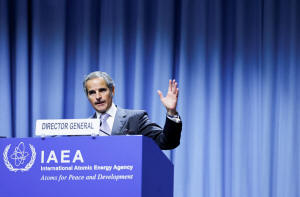|
The
submarine deal is part of a three-way defence agreement
announced by Washington, London and Canberra last month which
infuriated France because Australia said it would cancel an
existing order for French diesel-powered submarines.
It would also be the first time that a party to the nuclear
Non-Proliferation Treaty obtains nuclear submarines, apart from
the five nuclear weapons states recognised by the NPT - the
United States, Russia, China, France and Britain. India, which
has not signed the NPT, also has nuclear submarines.
"It is a technically very tricky question and it will be the
first time that a country that does not have nuclear weapons has
a nuclear sub," IAEA chief Rafael Grossi, whose agency polices
the NPT, told the BBC's HardTalk programme in comments broadcast
on Tuesday.
Grossi confirmed that an NPT signatory can exclude nuclear
material from IAEA supervision, also known as safeguards, while
that material is fuelling a submarine. It is a rare exception to
the IAEA's constant supervision of all nuclear material to
ensure it is not used to make atom bombs.
"In other words, a country ... is taking material away from the
inspectors for some time, and we are talking about highly, very
highly enriched uranium," he said.
"What this means is that we, with Australia, with the United
States and with the United Kingdom, we have to enter into a very
complex, technical negotiation to see to it that as a result of
this there is no weakening of the nuclear non-proliferation
regime."
He did not indicate how long those negotiations would last.
(Reporting by Francois Murphy; Editing by Angus MacSwan)
[© 2021 Thomson Reuters. All rights
reserved.] Copyright 2021 Reuters. All rights reserved. This material may not be published,
broadcast, rewritten or redistributed.
Thompson Reuters is solely responsible for this content.

|
|




